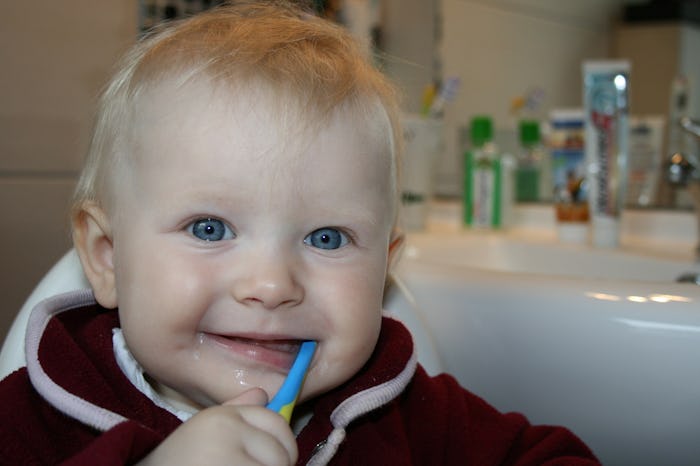Life
Some Babies Are Over One Before Their First Tooth — Is That OK?
The nine months (or ten, depending on who you ask) you spent growing a tiny inside of you were likely filled with questions. You might be surprised to learn that life is not much different once the baby finally arrives. When I first became a mother, I followed the pediatrician's suggested developmental guideline like it was scripture. So when your baby ever falls outside of those perimeters, that can be cause for concern as a parent. For instance, you may wonder, "is it OK that my baby is 12 months and not teething?" When it comes to how and when your child reaches certain milestones, it can be hard to say what is and isn't "normal" since that term is fairly relative at best.
The short answer is that it is perfectly okay that your child is 12 months or a year old before they show any signs of teething. With that said, many pediatricians and medical professionals do have a universally standard timeline for what is considered to be the typical or average teething process. If you are not exactly sure what falls under the umbrella, Healthline reported that teething is when a baby's teeth begin to come through their gums and can show such symptoms as drooling, being irritable, and having a loss of appetite. This of course, varies from infant to infant. Even my own son showed distinctly separate symptoms as his different teeth erupted. And though teeth usually come in in a certain order (bottom front two, top front two, molars last, etc.), it is entirely normal if your child's pearly whites show up in a random pattern, Healthline further explained. Of course, if you are ever seriously concerned, you should not hesitate to check in with your child's pediatrician just to be safe.
According to dentist Dr. Mark Burhenne, "it's not that unusual for babies not to have any teeth at 12 months old," he tells Romper. "I've seen teething in babies as early as four months old and as late as 16 to 17 months." A wide age range like that leaves plenty of room for variations and is actually pretty reassuring. To calm your fears even more, pediatrician Dr. Danelle Fisher says that parents can safely wait until their child is 18 months old before checking with a physician. It is always a good idea to trust your parental instinct, though. If something feels off to you, then do not hesitate to reach out to your child's doctor or pediatric dentist.
If you find yourself still impatiently checking your watch, waiting to see when your little one's first tooth will make an appearance, you might be able to take cues from your own life. Pediatric dentist Dr. Jill Lasky says that using your dental history as a guideline can be helpful. "If mom or dad were late teethers, then children will be, too." A quick call to your parents or your in-laws can help give you an idea of when to expect your child to begin the teething process. But even then, using your history is more akin to offering you a rule of thumb rather than an absolute forecast.
Regularly checking in with your child's pediatrician to keep everything up to date has surprising added benefits, besides acting as a preventative measure. "This should be the beginning of establishing a relationship with the dental team and creating an 'oral care home base' to support the baby's future oral health," Dr. Larry Williams of the of The Academy of General Dentistry and Midwestern University tells Romper. "A lot of other new parent questions can be answered as well — nursing, bottle feeding, when to brush, how to brush, etc.," all during your routine communication. So what's the takeaway? Every child grows at their own pace and it's totally OK if you baby is 12 months old and hasn't gotten their first tooth yet.
Check out Romper's new video series, Romper's Doula Diaries:
Watch full episodes of Romper's Doula Diaries on Facebook Watch.
This article was originally published on
